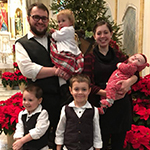The first reading today from Exodus describes a fascinating transformation that happened to Moses at Mt. Sinai. After conversing with God on the mountain, and whenever he spoke with God in the tabernacle, Moses’ face glowed. His skin shone so brightly that his brother Aaron was afraid of him and the people begged him to wear a veil. While this story may be odd, it offers us a beautiful image for what our own relationship with God should, and can, look like.
Catechism 221 says that “the reason God created us, our destiny, is to share in the divine life of the Holy Trinity.” And Catechism 460 says, “For the Son of God became man so that we might become God.” We are destined, our ultimate purpose is to become divine. This idea goes by many names, theosis, divinization, sanctification, and growing in holiness, but they all express the same belief. As the priest says at Mass when he mixes the water and wine at the altar, “May we come to share in the divinity of Christ who humbled himself to share in our humanity.”
When St. Matthew wrote about Jesus’ Transfiguration on the mountain he had in mind the story of Moses’ glowing face in mind. The glorified and resurrected body of Jesus is the image for our own destiny.
The Responsorial Psalm today proclaims, “Holy is the Lord our God.” In the Old Testament, the holiness of God was a truly frightening thing. When God revealed Himself to the whole people of Israel on Mt. Sinai in Exodus 19 and 20, they were so afraid that they begged Moses to make sure God never does that again. Even when Moses asked to see the Lord’s face in Exodus 33, God said no because the glory of the Lord’s face would have killed Moses on the spot.
However, God became man and bridged that chasm between divinity and humanity. Seeing God in his holiness won’t kill us; it will transform us into him. As St. John says, “Beloved, we are God’s children now; what we shall be has not yet been revealed. We do know that when it is revealed, we shall be like him, for we shall see him as he is” (1 John 3:2).
“I call you friends,” says Jesus. What an incredible thought. We can converse with God like he is a friend. Only God can make us like himself, can make us divine, but we must cooperate. This divine life is the treasure, the pearl of great price, that Jesus speaks of the Gospel. One of the primary ways we cooperate with this process of growing in holiness, of becoming like God, is through prayer, conversation with God.
In his document on holiness, the pope speaks about the necessity of prayer. At one point, he says:
“Are there moments when you place yourself quietly in the Lord’s presence, when you calmly spend time with him, when you bask in his gaze? Do you let his fire inflame your heart? Unless you let him warm you more and more with his love and tenderness, you will not catch fire. How will you then be able to set the hearts of others on fire by your words and witness? If, gazing on the face of Christ, you feel unable to let yourself be healed and transformed, then enter into the Lord’s heart, into his wounds, for that is the abode of divine mercy” (Gaudete et Exsultate 151).
Just as Moses’ face became radiant when he basked in the presence of God, so to can our hearts, our whole being, become radiant through prayer. Take some time to sit with the Lord in silence. Share with him whatever is on your heart, your insignificant worries, and your deepest longings. Then sit in his presence and let Christ share his heart with you. Let him speak into your life. Let him make you radiant.

Paul Fahey is a husband, father, and a parish director of religious education. He can be found at his website, Rejoice and be Glad: Catholicism in the Pope Francis Generation or read his work at Where Peter Is.


